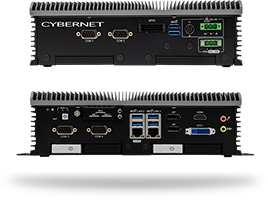Most computers operate on a work schedule similar to humans. They have periods of activity interspersed with downtime, like how most workers alternate between work shifts and rest. However, some computers don't have that luxury. Some computers must operate 24 hours a day, seven days a week. For instance, industrial panel PCs on an oil rig cannot be shut down without putting the entire rig in danger.
Computers meant for 24/7 operation face certain challenges and must integrate certain design features to ensure they remain reliable. In today's article, we'll review these challenges and how computers can be made to answer them.
Challenges for Computers Operating 24/7
The two greatest challenges for computers trying to operate continuously are overheating and mechanical breakdown. As a computer's CPU and GPU compute data, they naturally generate heat. If a computer runs too hot for too long, it can cause it to perform slower or even suffer permanent damage as parts of the processor break or melt.
Therefore, this heat needs to be removed before it can cause damage. However, this brings the second major challenge computers operating 24/7 face: the increasing likelihood of mechanical failure. Most consumer-grade PCs rely on fans to blow hot air away and bring cold air in over the PC's components. However, these fans have two significant drawbacks.
First, fans are noisy and can be distracting. Second, moving parts like fans are the most vulnerable parts in any machine to mechanical failure. A fan must spin hundreds of times a minute to circulate air properly, suffering more wear and tear with every rotation. When fans eventually break down, the computer breaks down as well.
Lastly, consumer-grade PCs frequently receive patches and updates that require the computer to shut down completely to update its software. This is fine for a computer that alternates between use and inactivity, but computers expected to operate 24/7 cannot afford to stop working just to install a patch.
How Do Computers Meet These Challenges?
Rather than relying on unreliable fans, computers can use passive cooling technologies instead. Passive cooling technologies are far more reliable by not depending on moving parts. The two most common types of passive cooling are heatsinks and vapor chambers, both of which are proven and widely used solutions.
- Heatsinks are pieces of thermally conductive metal, such as aluminum or copper, attached to the computer's parts that generate the most heat (typically the CPU). These heatsinks rely on the basic thermodynamic principle that heat transfers from warmer areas and surfaces to colder ones to draw heat away from the computer and into the heatsink. From there, heat transfers into a fluid medium (in this case, the air around the heatsink). Even the case of an industrial rack mount PC will be designed to aid in this process.
- Vapor chambers consist of a small chamber with a wick structure lining its interior and filled with a small amount of liquid, usually water. This chamber is vacuum sealed so that the fluid vaporizes at lower temperatures than its usual boiling point, which makes it more effective at transferring heat. As the computer generates heat, it is transferred into the fluid in the vapor chamber. The fluid vaporizes, expands, and moves away from the heat source at the other end of the chamber. There, it cools, condenses, and moves back to the source of the heat in a continuous cycle. Vapor chambers are especially popular for smartphones and industrial-grade tablets, which do not have enough room for larger or heavier cooling solutions.
The final major issue of updates forcing the computer to restart is avoided by committing to a computer's image and not modifying it afterward. This means no patches later down the line or programs added or removed from the computer. This has the side benefit of reducing training time, as staff don't need to be updated on changes the updates might have brought.
Conclusion
The challenges industrial computers face when trying to operate without interruption are considerable. However, with the right design and engineering, they can run 24/7 without issues, providing constant service.
If you're looking for computers that can sustain 24/7 operation, contact the team at Cybernet Manufacturing. We'd be happy to discuss how our products are designed with reliability and longevity in mind.
Join the conversation and connect with us on this and other relevant topics - Follow us on Facebook, Twitter, and LinkedIn.


